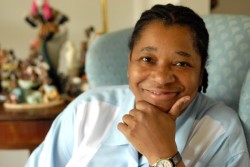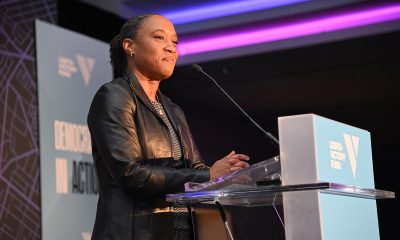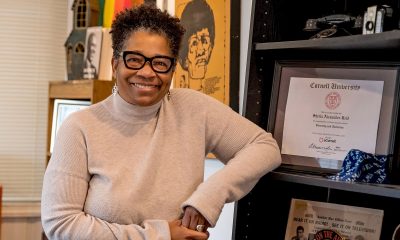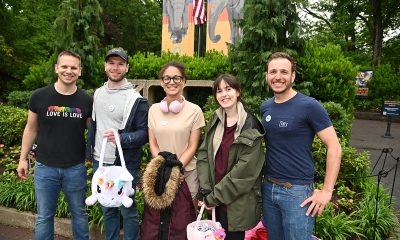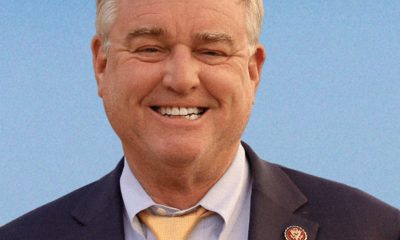Arts & Entertainment
Black lesbian event has final party this weekend
Alexander-Reid saw Women in the Life evolve into non-profit over 18 years
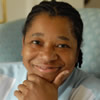
Lesbian activist and events promoter Sheila Alexander-Reid has announced she’s stepping down from heading the D.C.-based Women in the Life Association after 18 years. It concludes with a bounty of activities this weekend.
A party being billed as “The Last First Friday” is tonight from 9 p.m. to 3 a.m. at the Loft at the Warehouse (4th and Penn streets, N.E. off New York Avenue). An open mic night was held Thursday night. On Saturday, a cocktail reception will be held at Martin’s Lounge at 1919 9th St. (near 9th and U) from 7-11 p.m. featuring singer/songwriter Angie Head. Admission to tonight’s party is $20. Saturday’s is $15. Visit lastfirstfriday.com for more information.
Women in the Life has been mostly inactive for the last year. Alexander-Reid said many of the factors that contributed to the group’s founding are moot points now. She’s also at a different time and age in her own life, she said.
“I’m quite frankly just tired,” she said. “I’m hearing from all over the country people saying, ‘You can’t let this die, it needs to continue,’ and so on. When we started there was more of a need for safe spaces for professional lesbians of color to get together, raise visibility in the greater LGBT community … some of the main reasons we started are no longer needed. There are other needs that I’d eventually like to address, things like mental health concerns, obesity, smoking, but right now I’m taking a break. It remains to be seen if this is just a hiatus for Women in the Life or the end. It may come back in a different incarnation, but we’ll see. I’m open to that but I’m not committing to that.”
Bob Witeck, of Witeck-Combs Communication and a former Women in the Life board member, said it’s a different era in many ways from when Alexander-Reid formed the organization.
“She was pre-Internet,” he said. “None of us had these tools to connect the way we do now. I wouldn’t say she’s old school, but the place she held has changed and those gaps and vacuums are different than they used to be.”
Witeck said Alexander-Reid deserves high praise for her efforts.
“She fulfilled a pioneering leadership that is unparalleled,” he said. “There really isn’t a counterpart for the bridge that she built. Plus she’s just exciting to be around with her warmth and her curiosity. She’s a dynamo who changes and improves everything she touches.”
Women in the Life began as a for-profit events agency providing First Friday nightclub events for local black lesbians. Alexander-Reid said over the years, her crowd was typically between 75-80 percent black. It broadened into the scope of a non-profit in the early ’00s when she started publishing a newsletter/magazine for her regulars that was extraordinarily popular. After her friend, Wanda Alston, was murdered, she started Wanda’s Will Project to encourage lesbians to get wills in place. All along, Alexander-Reid maintained her job as a business development manager at City Paper. She said eventually Women in the Life got out of control and could have easily been a full-time job, so she pulled back.
“I feel good about what I accomplished,” she said. “But our community has so much more now and I’d like to take a break.”
Movies
Deliciously queer ‘Dead Boy Detectives’ a case worth taking on
A light-hearted, smart, and complex sensibility behind the fantasy
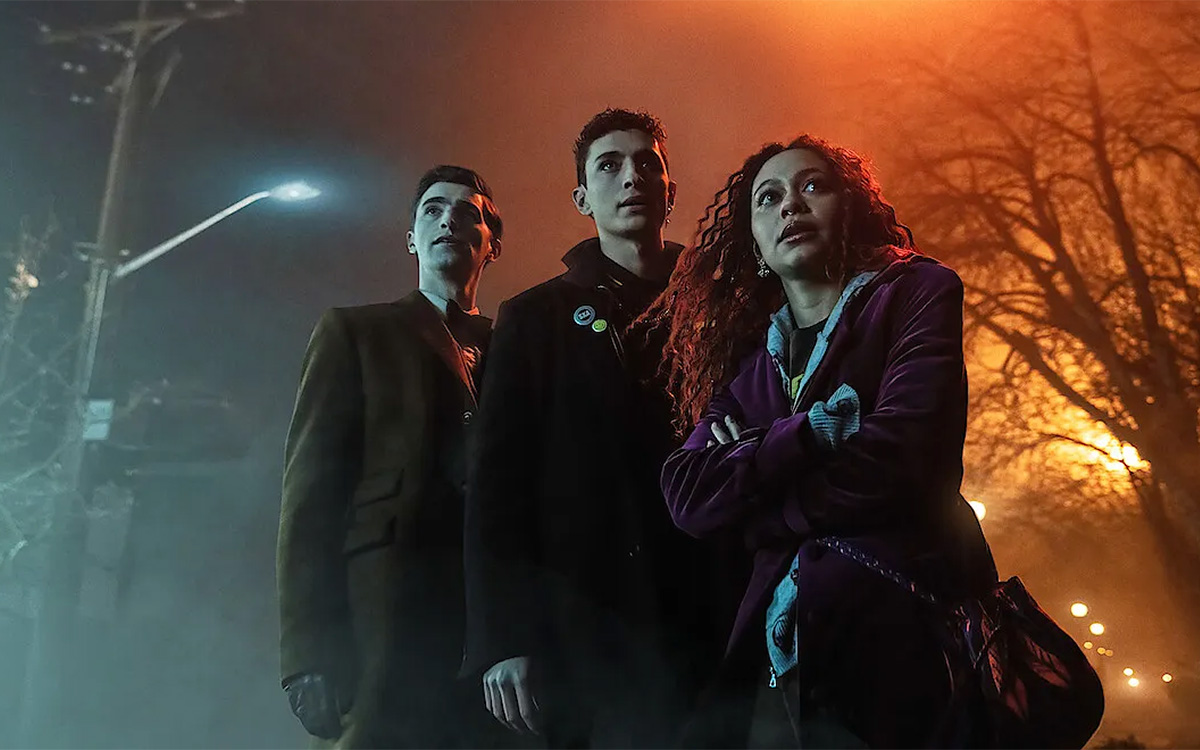
Believe it or not, there was once a time when the Hollywood entertainment industry didn’t take comic books very seriously — but then, neither did anyone else.
In the early days, comics were dismissed by most adults as childish fantasy; indeed, those with a penchant for clutching pearls saw them as a threat to their children’s intellectual development and therefore to the future of America itself. Their popularity could not be denied, however, and Hollywood, ever eager to capitalize on a trend, was certainly hungry to get a piece of the action.
The problem was that the studio lackeys assigned to adapt the comics for the screen during those “golden years” were never actually fans of the comics themselves. The result was a parade of kitschy – if occasionally stylish – low-budget serials, kiddie matinees, and “B movies” which operated, for the most part, at the level of cartoons, and mindless ones at that. Even in the 1960s, when comics like “X-Men” had begun exploring mature themes and turning the comic book into a counterculture phenomenon, the best that Hollywood – now deploying the then-relatively new medium of television – was a “Batman” series that felt even campier than the corny serials of three decades before.
Yet despite being treated as a throwaway genre with no cultural significance or intellectual value, the popularity never went away – and with the generation that grew up with comics now old enough to be working in Hollywood themselves, a new burst of creativity began to infuse the screen’s version of the genre with the kind of nuance and sophistication that fans had always known was there. Fast forward to 2024, when comics-based content dominates not just our movie screens – nobody needs to be told about the way it has shaped (some would say crippled) the mainstream film industry for the last decade or so – but all our other screens, as well. And while much of the material that has resulted from this obsessive fascination with comics (and comics-adjacent material like “Star Wars” and other similar fantasy franchises) often suffers from the same safe “appeal to the LCD” mentality that robbed the vintage stuff of its potential, the artistry of creators who are fans themselves has also resulted in a lot of genuinely good storytelling.
In the latter category, we offer up “Dead Boy Detectives” – a new series derived from a supplemental thread in renowned comics creator-turned-bestselling author Neil Gaiman’s groundbreaking “Sandman”, which debuted last week on Netflix – as a counter to the increasingly popular notion that comic books have hamstrung the industry’s creativity.
Based on characters and storylines that emerged during the original run of Gaiman’s iconic book (published by DC Comics via its Vertigo imprint), it’s a fresh, funny-yet-emotionally engaging supernatural saga in which two ghosts who died in their youth – the titular “Dead Boys” – operate a detective agency in London, solving mysteries for other spirits who need closure before moving on to the afterlife.
The boys themselves – Edwin (George Rexstrew) and Charles (Jayden Revri) – are not quite ready to depart the earthly plane, themselves; on the contrary, they operate on the lam, making sure to keep one step ahead of Death (Kirby Howell-Baptiste, reprising her role from Netflix’s acclaimed “Sandman” adaptation) so that she can’t drag them out of it before they’re ready. Something of a mismatched pair (both died at the same English boarding school, but 60 years apart), they nevertheless have established a fondness for each other and a dynamic together that makes them an excellent team in solving the supernatural crimes they encounter in their work. Their biggest handicap is the difficulty of dealing with the living – who, for the most part, cannot see or hear them – when it becomes necessary in an investigation. Fortunately for them (and for the story, of course), they find a solution to that issue during episode one.
Enlisted by the ghost of a Victorian child to rescue the human medium – Crystal Palace (Kassius Nelson), possessed by a former boyfriend who was actually a demon (David Iacono) – that has been trying to help her “cross over”, the detectives find themselves with living ally who can not only interact with them, but also with the “real” world in which they do their work. With Crystal on the team, they are soon called to an American seaport town to investigate the disappearance of a child – who, it turns out, has been abducted by a witch (Jenn Lyon) intent on draining her youthful essence in pursuit of her own immortal beauty. We don’t want to give anything away, but during the course of the case they not only incur her wrath, but set off alarm bells on the “other side”, calling attention to the fact that two AWOL souls are still lingering in the human world.
Things get worse for them in the second episode, when Edwin attracts the interest of the local “Cat King” (Lukas Gage, “White Lotus,” “Down Low”) and subsequently finds himself cursed to remain until he has “counted all the cats” in town – a daunting and maybe impossible task.
Though jumping into the second installment might feel like getting ahead of ourselves, it’s important to look ahead for the sake of exploring the show’s deliciously pervasive queerness, so forgive the spoiler-ish jump; because it is Edwin, who died in an era long before being openly attracted to other boys could even be discussed, let alone accepted, that serves to root the story’s tension into a real-life context that helps all the supernatural nonsense connect with relatable real-world experience and emotion. Uncomfortable more than a century after his death with the secrets of his own sexuality, he finds himself hampered by his jealousy of the obvious growing attraction between his literal BFF and the new girl psychic who has joined their team – as well as vulnerable to manipulation from both the witch who has it in for him and the Cat King who… well, let’s just say his cat-counting curse could be easily lifted if he would only accept another way to appease the libidinous (and far from unappealing) feline monarch.
It’s best we stop there, before we reveal too much; the series – developed by Steve Yockey and produced by (among others) original author Gaiman and out queer TV impresario Greg Berlanti – sets up its story arc very plainly from the beginning, so savvy viewers will read the subtext long before any definitive events take place, but much of what makes it fun is watching how it all unfolds.
Suffice to say that, with engaging performances from all its players, a light-hearted, smart, and complex sensibility behind all of its fantasy elements, and a palpably queer vibe that leaves plenty of room for allies to jump on board, too, it’s one of the more worthwhile (and meaningful) “comic book” stories to hit our screens in a long while.
Maybe more importantly, it’s also entertaining, which makes it easy for us to recommend “Dead Boy Detectives” as a case you’ll definitely want to accept.
Celebrity News
John Waters released from hospital after car accident
Crash took place in Baltimore County
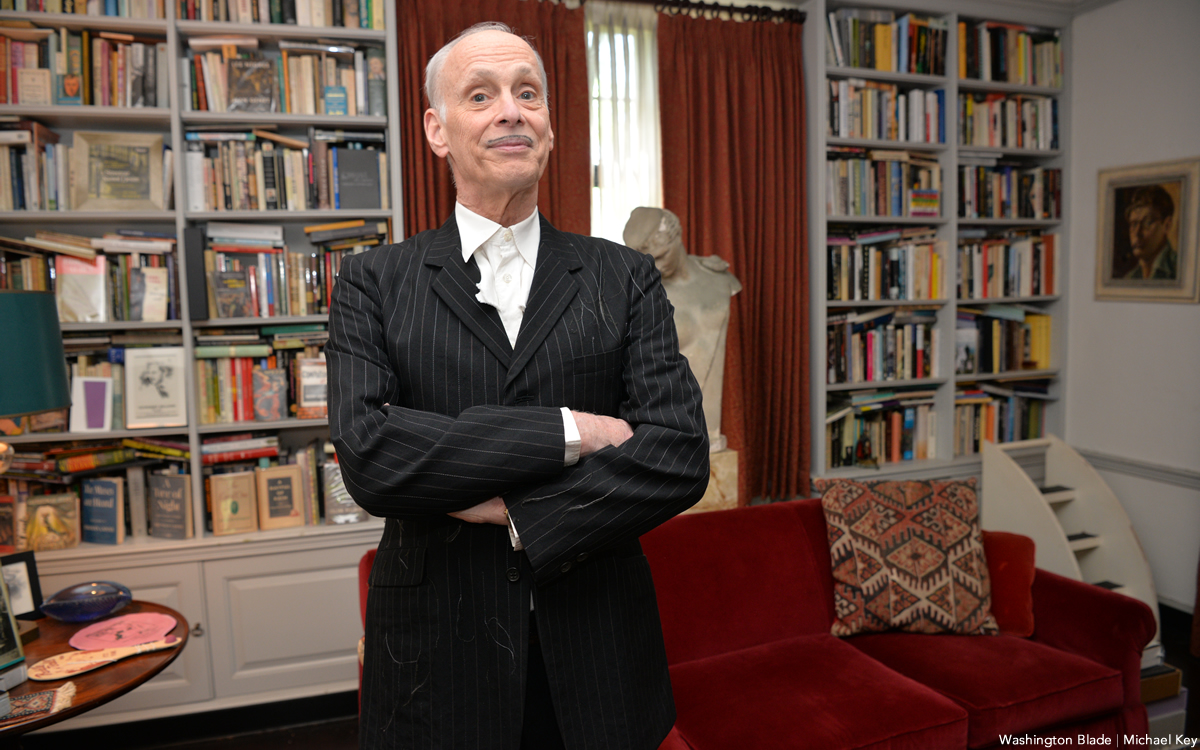
BY TAJI BURRIS | Baltimore filmmaker John Waters was released from the hospital Tuesday morning following a car accident.
The 78-year-old released a statement saying that although he was hurt in the Baltimore County crash, he did not sustain major injuries.
The rest of this article can be found on the Baltimore Banner’s website.
Arts & Entertainment
Washington Blade’s Pride on the Pier and fireworks show returning June 8
The annual Pride on the Pier Fireworks Show presented by the Leonard-Litz Foundation will take place on Saturday, June 8 at 9 p.m.

The Washington Blade, in partnership with LURe DC and The Wharf, is excited to announce the 5th annual Pride on the Pier and fireworks show during D.C. Pride weekend on Saturday, June 8, 2024, from 2-10 p.m.
The event will include the annual Pride on the Pier Fireworks Show presented by the Leonard-Litz Foundation at 9 p.m.
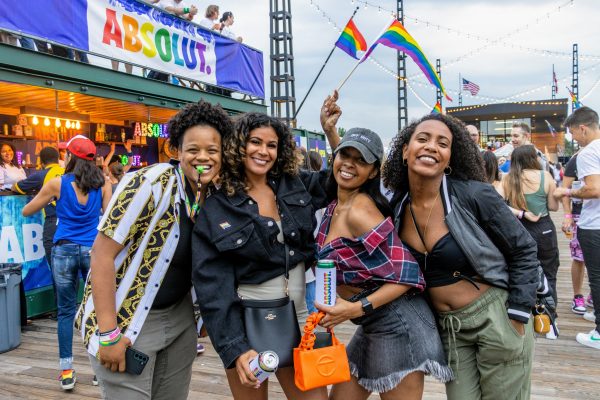
Pride on the Pier extends the city’s annual celebration of LGBTQ visibility to the bustling Southwest waterfront with an exciting array of activities and entertainment for all ages. The District Pier will offer DJs, dancing, drag, and other entertainment. Alcoholic beverages will be available for purchase for those 21 and older. Local DJ’s Heat, Eletrox and Honey will perform throughout the event.
3 p.m. – Capital Pride Parade on the Big Screen
3:30 p.m. – Drag Show hosted by Cake Pop!
9 p.m. – Fireworks Show Presented by Leonard-Litz Foundation
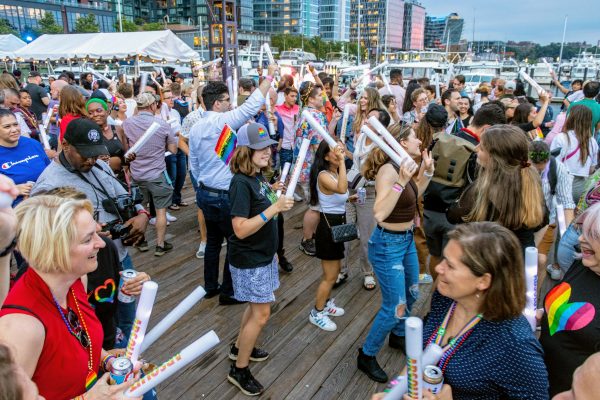
The event is free and open to the public. The Dockmasters Building will be home to a VIP experience. To learn more and to purchase tickets go to www.prideonthepier.com/vip. VIP tickets are limited.
Event sponsors include Absolut, Buying Time, Capital Pride, DC Brau, DC Fray, Burney Wealth Management, Infinate Legacy, Leonard-Litz Foundation, Mayor’s Office of LGBTQ Affairs, MISTR, NBC4, The Wharf. More information regarding activities will be released at www.PrideOnThePier.com

